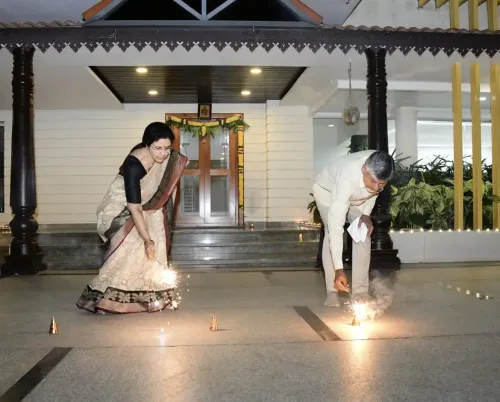Why Did Ekta Kapoor Initially Reject the Relaunch of 'Kyunki Saas Bhi Kabhi Bahu Thi'?

Synopsis
Key Takeaways
- Ekta Kapoor's initial rejection of the relaunch was due to concerns about nostalgia.
- The show empowered women and sparked crucial dialogues in Indian households.
- Kapoor envisions a bold and relevant new direction for the series.
- Modern storytelling will address current societal issues.
- Impactful narratives are prioritized over TRP ratings.
Mumbai, July 10 (NationPress) Producer Ekta Kapoor took to social media on Thursday to explain her initial reluctance to relaunch her iconic TV series ‘Kyunki Saas Bhi Kabhi Bahu Thi’. With the show approaching its 25th anniversary, Kapoor contemplated the challenges of recreating something so beloved by audiences. She shared a thoughtful note on Instagram, stating that her first response to the relaunch idea was a resounding no, as she questioned the necessity of revisiting a piece of cultural nostalgia. The note read, “Why Kyunki, Why Now? As we approached the 25th year of ‘Kyunki Saas Bhi Kabhi Bahu Thi’, my immediate thought was a firm no! Why would I want to disrupt nostalgia? You cannot compete with nostalgia; it will always reign supreme. My memories of childhood and how it truly was will forever be distinct.”
“Moreover, the television landscape has transformed. Once reliant on nine cities, audiences now consume content in fragments spread across various platforms. Would this tarnish the legacy of Kyunki, a show that achieved TRP numbers unmatched before or after?”
“But was that merely the legacy of the show? Was it just about high ratings? A study conducted by an international organization concluded that the series empowered women in Indian households. Between 2000 and 2005, women began to engage in family discussions for the first time, a significant shift influenced by Indian television, particularly Kyunki Saas Bhi Kabhi Bahu Thi and Kahaani Ghar Ghar Ki.”
The note continued, “Kyunki emerged as a global ambassador, promoting India's storytelling traditions across the globe. It was more than a daily soap; it introduced discussions around domestic r*pe, marital r*pe, age shaming, and euthanasia at Indian dining tables. That was the authentic legacy of the narrative.”
“In discussions with industry peers, the show's abrupt conclusion lingered in our minds. It felt incomplete. So, when Kevin Vaz, his team, the network heads, and the Balaji team brainstormed, I pondered... Can we modernize Kyunki while staying true to its roots, focusing once more on the issues that television once boldly addressed? Can we center it around impactful storytelling rather than TRP metrics? Can we harness the ability to reach millions and genuinely influence mindsets?”
“Can we engage in conversations about parenting? The balance between concern and control? Can we tackle topics we currently avoid? Can we utilize the beloved and ubiquitous platform of Indian television to tell a story that resonates and educates while entertaining? Can we revive the era when families gathered at the dinner table for meaningful conversations? The moment I posed this question to myself, clarity washed over me, accompanied by a smile.”
Ekta Kapoor further elaborated on her refreshed vision for the show, vowing to create a version that is not only nostalgic but also bold, relevant, and emotionally impactful. “I declared, ‘Let’s do this!’” Kapoor wrote. “Let’s produce a show that isn’t afraid to raise significant questions, ignite conversations, and stand out in this age dominated by visual gimmicks.” She stressed that while Kyunki will honor its illustrious past, it aims to progress with intention—prioritizing impact over imitation.
The revamped series, according to Kapoor, will aspire to entertain, provoke thought, and inspire audiences—remaining relatable and inclusive without coming across as preachy.
The esteemed producer concluded her post with, “Cheers to Kyunki, cheers to the essence of storytelling, cheers to less of the past, and cheers to what lies ahead! We can never triumph over nostalgia. However, the battle is not about winning; it’s about making an impact!”









